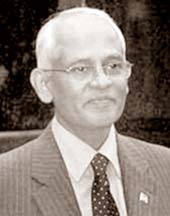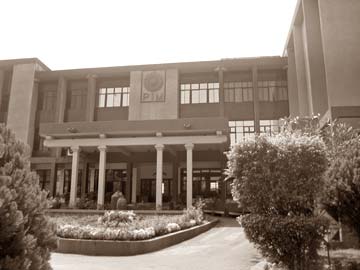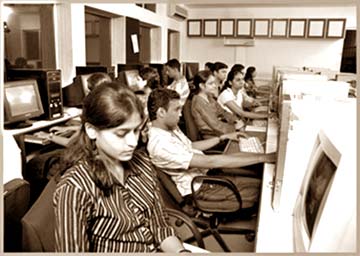Towards management education and development
 |
|
Secretary
to the President Lalith Weeratunga |
Postgraduate Institute of Management (PIM) is an educational
institution that has set a standard and class of its own. I have seen
many excellent institutions, and I have no hesitation to say that the
PIM stands tall among the best in the trade. It is a signal honour
therefore bestowed on me to be invited by such an institution to address
its Convocation because from its very beginning, it has been independent
and making choices based on strict criteria.
I have been associated with this great institution and have seen how
it became what it is today. Creating something extraordinary is no easy
task. I recall Stephen Covey’s much discussed Seven Habits of Highly
Effective People, where he argues that most effective people in the
world “Begin with the end in mind”. Undoubtedly, PIM’s founding director
had the end in mind when he began this project of building the PIM from
scratch. Prof. Gunapala Nanayakkara, small in physique, tall and huge in
stature, must be applauded with gratitude for creating this great
institution for our nation. All the others who worked with him for their
sheer hard work, sweat and toil in building this hallowed institution
from scratch must be commended.
Having been selected for the MBA program in the mid 1980s, I was not
able, unfortunately, to follow the course and become one of its alumni,
but I guess I was lucky because Prof Nanayakkara offered me a faculty
position in 2001, thereby giving me an opportunity to be a part of PIM.
I have been influenced by Prof Nanayakkara in many positive ways, and in
the period of nearly three years I spent at the PIM, I learned a great
deal from my colleagues in the faculty, some of whom are here today,
including the present Director, Dr Uditha Liyanage and also shared my
experiences in the public sector. The intellectual discourse that
prevailed among the Faculty, between students and faculty is unique.
Come back home, this is another reason, for my intrinsic joy on this
momentous occasion.
It is difficult to think what one should be saying at a convocation;
I think you must read the Harvard Commencement speech - 2008 by J.K.
Rowling, the celebrated creator of Harry Potter to understand the
insights and dynamics of preparing such an address. I am going to read
an extract of it, so that I will be able to put my address this evening
into the right context.
| The
convocation address at the Convocation 2009 of the
Postgraduate Institute of Management by Secretary to the
President Lalith Weeratunga on June 16, 2009. |
“Delivering a commencement address is a great responsibility; or so I
thought until I cast my mind back to my own graduation. The commencement
speaker that day was the distinguished British philosopher Baroness Mary
Warnock. Reflecting on her speech has helped me enormously in writing
this one, because it turns out that I can’t remember a single word she
said. This liberating discovery enables me to proceed without any fear
that I might inadvertently influence you to abandon promising careers in
business, law or politics for the giddy delights of becoming a gay
wizard. You see? If all you remember in years to come is the ‘gay
wizard’ joke, I’ve still come out ahead of Baroness Mary Warnock.”
I don’t feel as helpless as J K Rowling; Dr Uditha Liyanage in his
customary style has been specific; the teacher in him came out when he
gently suggested that I speak on “Management Education and Development”.
Lest it is misunderstood, I am focusing how management education could
and should contribute towards a country’s development. I am treating
this important topic in the context of a new era of national development
and well-being, the dawn of which you and I have been fortunate enough
to witness.
You young ladies and gentlemen will go out into the world armed with
a well earned MBA and one of you with a Ph. D. A great majority of you
are already well employed. Few of you, I am sure, are in the public
sector. Development is not the sole prerogative of the Government.
Government is only the main stream and the facilitator for development
because creating public goods of value is one of the Government’s prime
responsibilities. We are at the threshold of a new era having achieved
what many in the world thought was invincible. We have now got to get
together, put our minds together and help the Government to take Sri
Lanka forward in a new direction, to a new destination, a destination
that will characterize one nation, united and bound together in a sense
camaraderie and collegiality.
Management education is of great importance because the knowledge,
skills and attitude required for those managers in the national
development process are so complex and multi-faceted. It is only through
a well-structured program of education and training that these could be
imparted to budding managers both in the public and private sectors.
Prof. Nanayakkara through his well compiled book, “Managing in Sri
Lanka, Problems and Prospects”, has influenced me in my own thinking on
this subject. He outlines a few home truths in his book, and I am going
to use them freely to build my argument.
You as leaders and managers would play a key role in the
determination of fundamental choices in the society. In your learning
process, which I believe would not stop after your MBA studies, you
would have been exposed firstly, to comprehend what these fundamental
choices are and secondly, to choose intelligently from among them.
Fundamental choices provide a basic framework for action and give
direction to national and societal progress. Progress of a nation, a
society, and at times a community, therefore depends on the choices you
and I make. I believe you understand the gravity and the importance of
your commitment in this process. Every time you make a choice, it is a
‘moment of truth.’
 |
|
The
Postgraduate Institute of Management |
Having made a choice, a manager has to be efficient or productive in
the implementation of the choice. It is here that you need organizations
and their support. A manager has to use the organizational mechanism so
that cost is minimized and time is used most productively in the
achievement of results envisaged in the choice. Understanding of human
behaviour is of utmost importance because we use teams, groups, and
individuals in different ways and combinations. We must use the best of
technology, particularly IT, in the implementation of our choices.
Communication is crucial; there are crucial conversations and crucial
confrontations. You see a number of new books dedicated to these
subjects appearing in book stores, these days. Crucial conversations are
about disagreements. Two or more people, often having different
opinions, don’t know how to work through their differences, digress into
silence or violence, and kill the free flow of ideas. Disagreements,
poorly handled, lead to poor decisions, strained relationships, and
eventually to disastrous results.
Crucial confrontations, on the other hand, are about disappointments.
Confrontations are made up of failed promises and missed expectations
and therefore comprise the very foundation of accountability. Questions
like “Why didn’t you do what you were supposed to do?” will be asked.
Confrontations are complicated, prickly and will keep you awake at
nights. These end only when a solution is reached, and both parties are
motivated and able to comply.
A word about implementation. As a nation, we have not shown
excellence in this facet of management. In general, project
implementation along with project management is a weak area.
The only example of excellence in this vital component comes from our
Armed Forces, who without any doubt, have done an excellent
implementation of what they were expected to do - the elimination of
armed terrorists from our soil, that too, before the expected time.
Implementation is all about self discipline and adhering to time lines
and understanding the objectives.
Given the above, what should be the primary function of our
management education and development? As I understand, the outcome of
management education and development should be to develop leaders and
managers with an objective mind, develop the analytical and innovative
mind, enable them to understand strengths and weaknesses of the
resources at one’s command, develop the ability to make choices for
system building, make them understand the innumerable complexities of
human behaviour and empower them to use the best and State-of-the-Art
methods for implementation to take their organizations to the desired
goal. As you know, managers with those abilities are rare. The job of
management schools has become exceedingly difficult.
Whether in private or public sector, these new leaders who are before
us will play leading roles in national development. For a moment, I want
you to focus on development. Should ‘development’ be interpreted only in
terms of economic criteria and criteria for social justice such as
growth and distribution, or should it embody socio-cultural elements? In
other words, should development also mean the promotion of certain
socio-cultural values, for example, social cohesion? This has become
more relevant and important than ever before.
We are at the threshold of a new era of development and national
integration. As President Mahinda Rajapaksa has emphasized during the
past few weeks, some sections of our population will not be considered
minorities, and all are the same. We have defeated terrorism and shown
the world - if there is a will, there is a way. We are a nation that has
stayed resilient throughout 26 years of barbaric terrorism when large
numbers of innocent civilians were killed by terrorists to create a
backlash. Development in the new era has assumed not only new paradigms
but enormous proportions. Managers in this new era will have to possess
new knowledge and skills that will enable them to work across language
and cultural barriers, comprehend subtle emotional vicissitudes of
people, and above all keep their eyes and ears open and hearts and minds
attuned to create a healthy and a robust nation.
Whether it is the private sector or the public sector, work places
are permutations and combinations of very complex human behavioural
patterns. Every second you live your life you need to be sharp, alert
and be with a great presence of mind. Self awareness at all times is
essential if you want to survive. This is also true for your home. You
cannot take its inhabitants for granted and behave in any way you want.
There are situations that need to be carefully assessed and right
responses made to a multitude of stimuli. This is no easy task.
I want to share with you something relevant in this regard - what the
26th United States President Theodore Roosevelt said on April 23, 1910
at the Sorbonne, “The Man in the Arena”.
“It is not the critic who counts; not the man who points out how the
strong man stumbles, or where the doer of deeds could have done them
better. The credit belongs to the man who is actually in the arena,
whose face is marred by dust and sweat and blood; who strives valiantly;
who errs, who comes short again and again, because there is no effort
without error and shortcoming; but who does actually strive to do the
deeds; who knows great enthusiasms, the great devotions; who spends
himself in a worthy cause; who at the best knows in the end the triumph
of high achievement, and who at the worst, if he fails, at least fails
while daring greatly, so that his place shall never be with those cold
and timid souls who neither know victory nor defeat.”
Those who have graduated today with a world class MBA, are you
prepared to enter that arena, to dare greatly, to know the great
enthusiasms, and the great devotions, and to spend yourself in a worthy
cause? If you are, in the end you will also know the triumph of high
achievement.
 |
|
Management
education contributes immensely to development |
That is the fulfillment of leadership.
You cannot find that fulfillment by observing leaders from the
sidelines or from the press box, high above the arena. You have no
choice but to get in there and get your face marred by dust and sweat
and blood.
Your fulfillment comes not from money, the titles, the awards, or the
recognition. These fleeting symbols of external gratification will
vanish like thin air. What will remain are: being passionate about
helping other people, or putting right societal wrongs; and making a
difference in the world through your combined efforts. There is no
satisfaction in your professional life that can compare to this
fulfillment.
Friends, before I conclude, I want to leave a thought with you.
Everyday is a new day, but with a history.
Every opportunity, an occasion to change the world.
Every human being, a resource that can make things better.
Every action, a chance to make the life of another meaningful.
|



